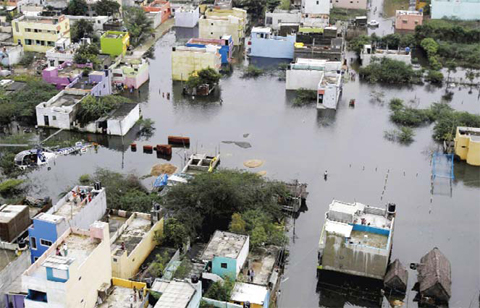 CHENNAI: A residential area is seen surrounded by floodwaters yesterday. — AP
CHENNAI: A residential area is seen surrounded by floodwaters yesterday. — APNEW DELHI: Severe floods that have hit the southern Indian state of Tamil Nadu killed 18 hospital patients this week after rainwaters knocked out generators and switched off ventilators, officials said yesterday. State authorities were investigating complaints of negligence by officials at MIOT International hospital in the state capital of Chennai, which is reeling from massive floods. The 18 patients were in the intensive care unit when a power outage affected ventilators in the hospital, leading to their deaths over the past two to three days, said state Health Secretary J Radhakrishnan. He said that floodwaters entered the room with the generators, cutting off power to the building and switching off the ventilators.
More than 280 people have died due to the floods in Chennai, a city of 9.6 million, and nearby districts, including several who were killed due to electric shocks from power distribution boxes that had been submerged by floodwaters. Authorities have turned off power supplies in some areas to prevent accidental deaths. Army soldiers using boats have rescued thousands of residents marooned in high-rise buildings and launched massive relief operations to provide food and medicine.
Although floodwaters have begun to recede, vast swaths of Chennai and neighboring districts were still under 2 1/2 to 3 m of water, with tens of thousands of people in state-run relief camps. As officials struggled to supply drinking water and food packets, people were complaining that relief had not yet reached several neighborhoods, four days after they were marooned or stranded on rooftops. With no electricity for more than four days, they had no way to charge their cellphones, they said.
"We feel quite helpless," said Malti Soman, standing in knee-deep water in Mambalam, a residential area in central Chennai. "The landline phones are not working. And my cellphone is dead because there is no electricity to charge it."
Radhakrishnan, the health secretary, said yesterday that while the immediate rescue operations were tapering off, the main focus of the administration in the coming days will be to prevent the spread of communicable diseases. In many areas, sewage drains have overflowed due to the rising floodwaters, posing a health hazard for residents who have had to wade through the water, Radhakrishnan said. "This is a concern," he said. "We are working with the local water and sewage agencies to disinfect the worst-hit areas."
Sanitation workers have begun spraying insecticide in many places to prevent the spread of vector-borne diseases such as malaria and dengue due to the stagnant water collected in large parts of the city. Chennai's airport was closed for a fourth day yesterday, although some flights operated from a nearby air force base. Railway services resumed partially, with a few trains running from Chennai's main train station.
India's main monsoon season runs from June through September, but for Chennai and the rest of the southeastern coast, the heaviest rainfall is from October to December, also called the retreating monsoon. This year's deluge - which experts linked to the El Nino weather pattern, when the waters of the Pacific Ocean get warmer than usual - caught Chennai completely unprepared.
No Warning
Residents say the city authorities gave no warning that they were going to open overflowing reservoirs into the Adyar River, which led to sharp rise in water levels. Vikram Kapur, a commissioner of the Chennai Corporation, a government body that administers the city, said that employees had gone to forewarn residents when the reservoir was opened up. "The local corporation official, the water works officer and the police are given instructions to inform the public," Kapur said.
In Jafferkjanpet and Vellachery, two of Chennai's worst affected areas, some said the authorities had only just showed up with food packets. "We have had no power, no milk for the children," said M A Sheikh, accusing the government and media were giving a false picture of the relief effort. When Prime Minister Narendra Modi visited the city this week he announced 10 million Indian rupees ($150,000) of extra assistance for relief operations. Late on Friday, Tamil Nadu's most senior state official, K Gnanadesikan, and other top colleagues appeared before reporters for the first time since the flooding and defended the aid operation, saying those involved were doing an "extraordinary job under trying circumstances". - Agencies










